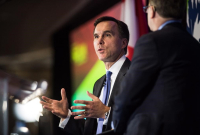The Senate won't be splitting the Trudeau government's budget bill to hive off the portion dealing with creation of a new infrastructure bank.
Senators have rejected by the narrowest of margins a motion to split the bill, defeating it on a tie vote of 38-38 late Monday.
The motion from independent Sen. Andre Pratte would have carved out the infrastructure bank provisions into a separate bill that could be examined at greater length.
Prime Minister Justin Trudeau and Finance Minister Bill Morneau had both urged senators to leave the bill intact and pass it before the summer parliamentary break.
And while Trudeau has encouraged senators to behave in a more independent, non-partisan manner, he had also warned that the government expects unelected senators to bow to the will of the elected House of Commons on budget matters.
While the government can breathe a little easier now that the bill is no longer at risk of being divided, senators could still potentially vote to amend it in some other way or even defeat it outright.
The government has maintained that the $35-billion infrastructure bank is an integral part of its economic plan to boost the economy and create jobs.
The bank is to be launched with $15 billion in direct federal investments and another $20 billion in repayable contributions, loans and loan guarantees. The government hopes to leverage up to $5 in private investment for every $1 in government funding to finance what it calls "transformational" infrastructure projects.
Pratte and other senators have objected to the bank's governance structure, which they fear could allow political interference in the choice of projects that get funded. They've also expressed concern that taxpayers will wind up on the hook for projects that go over-budget or flop.





Comments